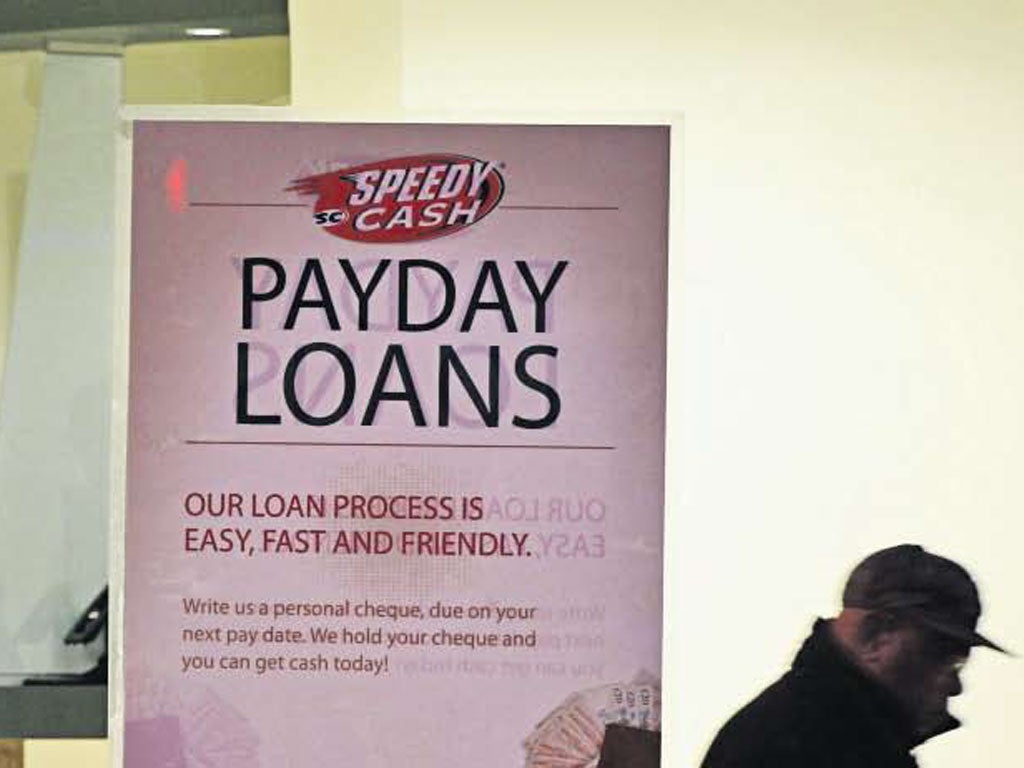Julian Knight: Put the brakes on payday loan peddlers
The industry is moving towards self-regulation but 2,000 per cent rates need tougher controls

Your support helps us to tell the story
From reproductive rights to climate change to Big Tech, The Independent is on the ground when the story is developing. Whether it's investigating the financials of Elon Musk's pro-Trump PAC or producing our latest documentary, 'The A Word', which shines a light on the American women fighting for reproductive rights, we know how important it is to parse out the facts from the messaging.
At such a critical moment in US history, we need reporters on the ground. Your donation allows us to keep sending journalists to speak to both sides of the story.
The Independent is trusted by Americans across the entire political spectrum. And unlike many other quality news outlets, we choose not to lock Americans out of our reporting and analysis with paywalls. We believe quality journalism should be available to everyone, paid for by those who can afford it.
Your support makes all the difference.As a big cycling fan I have been glued to the television coverage of the Tour de France. The kit, the colours, the sheer effort of the riders and of course the gorgeous mountain views – it's a heady sporting cocktail.
But daytime TV has its drawbacks, most noticeable the repetitious adverts for no-win no-fee law firms, debt management companies and of course the payday lenders. Like the tour riders on one of their descents the payday lenders skirt close to the edge over what is tastefully and legally acceptable with their adverts.
One company, for example, has adverts akin to a news programme, with reporters in the studio and interviews with passers-by (actors) on the street all praising the ease and sheer fun of taking a loan out at over 2,000 per cent APR. If they are not aping news programmes the adverts are mimicking the heroes of the Battle of Britain who pause from defending the world from Nazism to burst into a little jingle about how easy to arrange payday loans are.
In a grudging way you have to take your hat off to the marketeers of these loans. They are running rings around the advertising authorities and in a very short period of time made payday lending at astronomical rates seem an acceptable financial choice to many. Even the name "payday" is a victory for the marketing people – the suggestion is that it is the loans are purely there to tide you over until payday. Well the reality for many borrowers is much more drawn out and expensive than that.
The rate these firms charge is so high that it has even alerted our great political class. Even the most intellectually underwhelming of our MPs understand that 2,000 per cent APR is horrendously expensive. Like sale-and-rent-back schemes before them, the payday lenders are facing the prospect of some serious regulation down the road. There is talk of APR caps and at the very least tighter controls over marketing and the selling of multiple loans.
As a pre-emptive strike, this week some of the bigger players will be unveiling an industry code of conduct. Expect commitments not to rollover more than three loans and better credit checking.
As The Independent on Sunday exposed in May, the payday lenders are routinely failing to tell the credit reference agencies when an individual takes out a loan, expect some commitment to improve on that. Of course, this is all self regulation and the idea is to prevent any tougher statutory regulation ahead of the Financial Conduct Authority – the follow up to the Financial Services Authority – taking over the regulation of consumer credit in a couple of years time.
Let's hope it doesn't work and we have stronger controls limiting the expense and the way the loans are marketed. They could start with those daytime television adverts.
Bridging the gap
Another industry in dire need of a proper shake up is bridging loans. Recently The Independent on Sunday reported that this industry is attracting the close attention of the FSA with spot checks being carried out on brokers arranging these loans.
However, the FSA doesn't have oversight of the lenders as this is the remit of the Office of Fair Trading. The bridging lender trade body rightly advises anyone looking to use bridging should go to an FSA regulated broker because they should only advise a bridge if it's the most appropriate product.
The chief concerns lie with extortionate and hidden arrangement fees. Now, bridging is necessary – buying a property at auction to develop, for instance, is very difficult without it – and in the past it use to work well. But what has happened is that some of the figures who left the standard mortgage lending industry at the time of the financial crisis – following massive fraud in that sector – have popped up in the bridging space. This is a very dark part of financial services and I know the FSA is worried. It, as well as the legitimate players in the industry, must do all they can to target and eradicate the cowboys
Join our commenting forum
Join thought-provoking conversations, follow other Independent readers and see their replies
Comments